My favorite line is when P. Diddy tells Bjork that she's a kooky French bitch.
Courtesy of Insound.
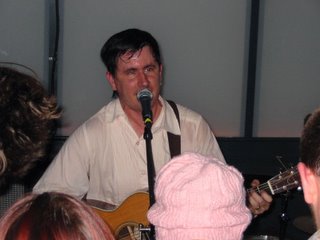 Last night, jds and I headed down to Hanover, NH to Dartmouth College's Rocket Fuel Club to catch The Mountain Goats. Hanover is a little less than an hour away from Montpelier and all interstates so it was a very easy trip.
Last night, jds and I headed down to Hanover, NH to Dartmouth College's Rocket Fuel Club to catch The Mountain Goats. Hanover is a little less than an hour away from Montpelier and all interstates so it was a very easy trip. The Prayers and Tears of Arthur Digby Sellers opened the show. I wasn't familiar with them before learning they were going to be the opening band. However, I had found a few mp3 files from their website to check out before the show. Based upon those mp3 files, I had expected them to be a folk based rock band. This proved to be a very wrong assumption as they proceeded to generate a lot more noise than I ever expected. jds noted how much they sounded like Radiohead and Interpol which was very accurate. There were even some chord progressions that led me sing Radiohead tunes to myself. Overall, they were OK but didn't inspire me to learn any more about them.
The Prayers and Tears of Arthur Digby Sellers opened the show. I wasn't familiar with them before learning they were going to be the opening band. However, I had found a few mp3 files from their website to check out before the show. Based upon those mp3 files, I had expected them to be a folk based rock band. This proved to be a very wrong assumption as they proceeded to generate a lot more noise than I ever expected. jds noted how much they sounded like Radiohead and Interpol which was very accurate. There were even some chord progressions that led me sing Radiohead tunes to myself. Overall, they were OK but didn't inspire me to learn any more about them.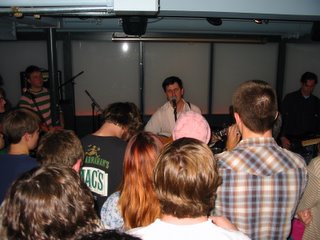 I had never seen the Goats before but had heard about Darnielle's facial expressions and repoir with the crowd. Both of those traits were on full display, which, combined with Darnielle's confidence and comfort with performing, made for an enjoyable show. They opened up with "Source Decay" which quickly got everyone into the show. They did a few tunes from their great 2005 release Sunset Tree such as "Love Love Love", "Dance Music" and "Lion's Teeth" but the set list included a wide variety of tunes. By the way, the guy in this photo against the pole with the green and pink striped shirt was the biggest Goat fan there. He spent every song leaning against the pole with his eyes closed mouthing the words. He never missed a word. I got the sense that he spends a lot of time laying on his dorm's bed listening to Darnielle over and over again.
I had never seen the Goats before but had heard about Darnielle's facial expressions and repoir with the crowd. Both of those traits were on full display, which, combined with Darnielle's confidence and comfort with performing, made for an enjoyable show. They opened up with "Source Decay" which quickly got everyone into the show. They did a few tunes from their great 2005 release Sunset Tree such as "Love Love Love", "Dance Music" and "Lion's Teeth" but the set list included a wide variety of tunes. By the way, the guy in this photo against the pole with the green and pink striped shirt was the biggest Goat fan there. He spent every song leaning against the pole with his eyes closed mouthing the words. He never missed a word. I got the sense that he spends a lot of time laying on his dorm's bed listening to Darnielle over and over again.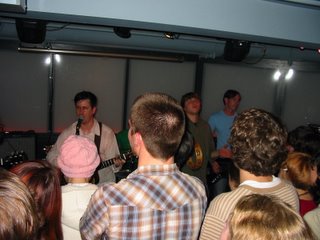 For the last few tunes, Darnielle brought the gang from The Prayers and Tears of Arthur Digby Sellers back out on stage. Together, they performed a cover of The Silver Jews' "Pet Politics". Being a big Joos fan, I was very excited. I had never heard a band cover them at a show. However, "Pet Politics" is one of my least favorite Joos tunes but Darnielle shortened the boring chorus and rawked it up a bit. The combination of those two things made the song sound great. It was a nice cap to a good evening. The crowd tried to bring the Goats back out for a second encore but Darnielle was done.
For the last few tunes, Darnielle brought the gang from The Prayers and Tears of Arthur Digby Sellers back out on stage. Together, they performed a cover of The Silver Jews' "Pet Politics". Being a big Joos fan, I was very excited. I had never heard a band cover them at a show. However, "Pet Politics" is one of my least favorite Joos tunes but Darnielle shortened the boring chorus and rawked it up a bit. The combination of those two things made the song sound great. It was a nice cap to a good evening. The crowd tried to bring the Goats back out for a second encore but Darnielle was done.BM: Music has gone from being a very important standalone art form to the soundtrack for other mixed media.
BVLR: You mean the way that, suddenly, every television show has an accompanying soundtrack CD?
BM: I'm just trying to think about it now. It used to be a sort of religius experience to go to see bands. There would be hundreds or thousands of people gathering for this common experience, and you don't even see that so much anymore. I mean, you do, but everything is sort of down one level from where it used to be. And now I think people are really fond of the kind of event where there's maybe fifty like-minded people. So, weve really created this world of niches.
I remember seeing this happening over the past ten or fifteen years. I remember the first time I got a CD in my mailbox from AT&T, promoting their new 56K modem, and it had, like, four free songs on it. I looked at it, and - you know, I remember getting Archies songs off the back of cereal boxes in the 60's - But I looked at this and went, "OK, so now something that they wanted me to pay for is showing up for free in my mailbox." This was almost ten years ago. I just thought, "This is the beginning of the end. The business is so desperate that they're going to start giving it away." And sure enough, they did, and then all the online mp3, P2P stuff happened.
BLVR: But that, in itself, doesn't necessarily mean that music has become devalued, right?
BM: Maybe I'm too removed now because I'm older but I'm just not sensing the sort of affinity that used to be there. You know, when Don Kirschner's Rock Concert came on and Alice Cooper came out with a snake, everybody talked about it for a year. They were like, "Holy shit, there was this freak on television with a snake." That was before everything was so overexposed and burned out in ten minutes. There was mystery; there was conjecture about what this guy was really like. That's all gone now.
BLVR: In the late 90's, you took another break from music to work for World Championship Wrestling before emerging with another stylistic departure, the largely electronic Modulate, in 2002. I want to know everything I can about professional wrestling. How did you get that job?Over the next two pages, Mould explains the history of pro wrestling, his childhood love for it and how he thought wrestling had lost good character-based stories in favor of silly stunts.
BM: It was through friends of friends. I'd dabbled in it a little in Minneapolis in the 1980's, sort of got let in to the inside and learned how it worked. I had creative ideas, and I talked to people [at WCW] - a position opened up because there was a regime change - just imagine any kind of TV show where the writers are rotated. For seven months I sat in on the committee that basically wrote and produced the TV shows. I was in a very stressful position because I was the last stop before people went through the curtain. It was my job to make sure the show looked right. You know, that the show hits all the marks, I guess, in a Broadway sense. All the time cues. I had to tell the referee to speed things up or slow things down. Or tell the guys to do this or do that.
BLVR: That seems like a huge responsiblity.
BM: It was kind of kooky. I got that responsibility put on me by the head writers, and I think I handled it well, but I was there for seven months working with a couple of different writing staffs. The numbers were sinking before I got there, and I wasn't able to help turn it around. I went home and they tried other people and went out of business in a year. I did the best I could.
BLVR: What did the other writers think of your ideas for more fleshed-out, old-school characters? Did anything make it through?
BM: There would be days when I would be sitting on committee, just listening to people bullshitting, just trying to brainstorm, and one week I remember I just said, "OK, I'm going to see how far I can push this." And I just started saying crazy stuff like, "Why don't we have this match where these two guys who really hate each other are fighting in a cage. They're fighting over this girl - we'll have the girtl chained up on top of the cage and they have to climb up the pole to get the key to unchain her so that she can climb up another pole to get some Viagra." And the head writers were like, "Man, you're on fire today, Bob! This is unbelievable!" And I'm just sitting there going, "Oh man. My time here is limited."
There were people in the WCW - talent who had really gripping personal life stories - being homeless at a young age, getting mixed up in drugs, people who were rock stars in Mexico - there were all these true fascinating verifiable lives and you could do video packages on these people to try to bring some reality back. Because when you lay out a story like that, where somebody had an abusive childhood, then you've got people's attention. Then, month's later, you can do something with it. But, you know, they wanted Viagra on a pole. What can you do?
The real question is: Which one of today's bluegrass groups will recast this antique art form into a truly new mold? The Velvet Underground did that for rock and, more recently, Uncle Tupelo did it for country. While split-rail is an immensely enjoyable debut, it doesn't quite amount to a bluegrass revolution. It'll be interesting to see where they take it from here.I'd love to hear a band take liberties with the roots of bluegrass and give it a modern artistic interpretation. It has great potential and I'm sure someone someday will seize upon it. PossumHaw didn't show that vision on this album but perhaps that isn't their thing; which is fine. I just wanted to use the end of the review as a soapbox to throw it out there as an idea and a challenge to Vermont's bluegrass scene.
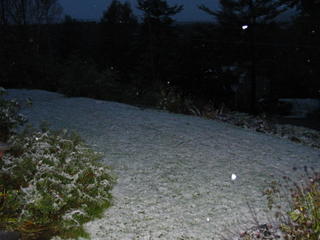 The forecast for last night was for just rain. However, as we came downstairs this morning, we found our first blanket of snow of the season. It was only a thin covering of snow but still enough to generate some excitement. The irony is that if I'll probably see a similar coating next April and be posting about how friggin' tired I am of winter. But for right now, it's fun to see it on our yard.
The forecast for last night was for just rain. However, as we came downstairs this morning, we found our first blanket of snow of the season. It was only a thin covering of snow but still enough to generate some excitement. The irony is that if I'll probably see a similar coating next April and be posting about how friggin' tired I am of winter. But for right now, it's fun to see it on our yard.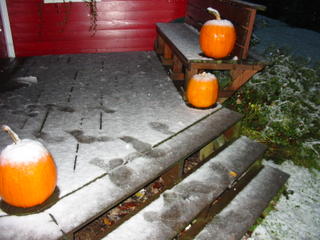 Instead, we headed outside for some snowball baseball and sledding before it all melted around noon. It was a lot of fun to clown around in the snow and a good reminder of the upside of winter. However, I kept thinking that this is just the first of seven straight months of seeing snow. It'll get old in the dark days of February but for right now, it's a good diversion.
Instead, we headed outside for some snowball baseball and sledding before it all melted around noon. It was a lot of fun to clown around in the snow and a good reminder of the upside of winter. However, I kept thinking that this is just the first of seven straight months of seeing snow. It'll get old in the dark days of February but for right now, it's a good diversion.
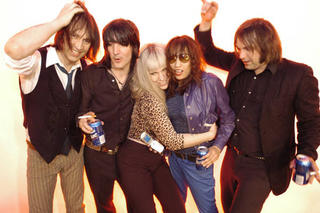 Sometimes a band sounds exactly like what they look like. Look at The Detroit Cobras over there. You know you are going to get something rocking with a filthy sexy bass line that'll fuel either a party or your excessive speeding. That's exactly what they deliver with the song "I Wanna Holler (But the Town's Too Small)" off their new album Baby. It's a little Elvis, a little Motown and a big scoop of grimey rock club.
Sometimes a band sounds exactly like what they look like. Look at The Detroit Cobras over there. You know you are going to get something rocking with a filthy sexy bass line that'll fuel either a party or your excessive speeding. That's exactly what they deliver with the song "I Wanna Holler (But the Town's Too Small)" off their new album Baby. It's a little Elvis, a little Motown and a big scoop of grimey rock club.What about Building 7, how does steel melt at 1,700 degrees Fahrenheit, what were those reported explosions inside the two towers heard by firemen and other victims, how come the Israelis didn’t show up for work, what about the extraordinary United and American Airlines put options that made someone a fortune, why was no photographic evidence of the crashed Boeing 757 shown in the Pentagon’s west wall, but only an impossibly small 15-foot hole, and how come the FBI snatched up that Arlington gas station’s video camera immediately, before anyone could see what was filmed, and no interceptions were launched in time, even to protect the world’s most defended structure, the military heart of the nation? And on and on. These questions ballooned out of me, building each upon the other, sickening in their scope and ambiguity.That's just crazy talk. As much as I disagree with the actions of the federal government at times, I don't think they were involved in 9/11. Just typing that last sentence feels crazy. A friend of mine was involved in the movement and recently resigned. He told me that the fringe has taken over the movement. Between his comments and that September newsletter, I'm not going to get behind the Second Vermont Republic.
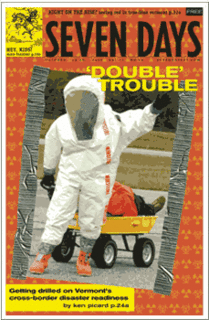 Time to take another look at what all you crazy mugs are buying and listening to in Vermont these days. Courtesy of Seven Days, here is what the top records sold at the local indie music stores were for the last week:
Time to take another look at what all you crazy mugs are buying and listening to in Vermont these days. Courtesy of Seven Days, here is what the top records sold at the local indie music stores were for the last week: Nobody is ever going to mistake me for a fashion maven but I do take an interest in the uniforms of the US National Soccer Team. Why? Because I always fear a return to the denim uniforms they wore during the 1994 World Cup.
Nobody is ever going to mistake me for a fashion maven but I do take an interest in the uniforms of the US National Soccer Team. Why? Because I always fear a return to the denim uniforms they wore during the 1994 World Cup. Logan's Revenge is claiming that the 2006 World Cup uniforms will be throwback uniforms with a racing stripe down the left side of an otherwise solid colored uniform. He likens it to the uniforms that were worn in the movie Victory (above) and the recent Juventus away jersey (designed by Nike)(below).
Logan's Revenge is claiming that the 2006 World Cup uniforms will be throwback uniforms with a racing stripe down the left side of an otherwise solid colored uniform. He likens it to the uniforms that were worn in the movie Victory (above) and the recent Juventus away jersey (designed by Nike)(below).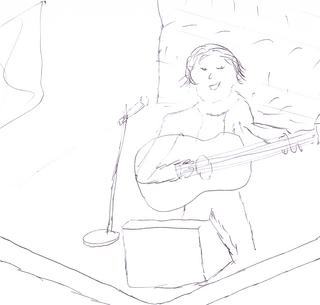 Nedelle is your classic folk singer with a beautiful voice. In fact, her voice reminds me a lot of Laura Veirs. Her first three songs were done solo but then she started adding in members of Lekman's band inlcuding Lekman himself. First she added the cellist and violinist for a pair of songs. Then Jens joined the party for a tune before Jens' drummer and bassist climbed aboard too. It was a nice way to show off her different sounds. I think I like her best with the full band but my friend liked her solo stuff the best. A little bit for everyone. Regardless, it was good enough to get me to buy one of her CDs after her performance.
Nedelle is your classic folk singer with a beautiful voice. In fact, her voice reminds me a lot of Laura Veirs. Her first three songs were done solo but then she started adding in members of Lekman's band inlcuding Lekman himself. First she added the cellist and violinist for a pair of songs. Then Jens joined the party for a tune before Jens' drummer and bassist climbed aboard too. It was a nice way to show off her different sounds. I think I like her best with the full band but my friend liked her solo stuff the best. A little bit for everyone. Regardless, it was good enough to get me to buy one of her CDs after her performance.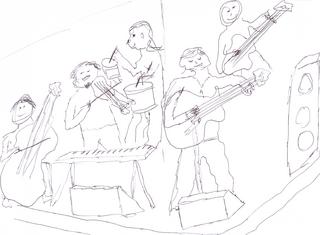 Lekman took the stage around 11pm with his aforementioned band. Plus, Nedelle and some other guy who looked familiar joined in on the side of the stage for occasional backing vocals. Despite my fears of cruddy sound problems, they sounded great. Jens vocals were mixed a little low but it must be tough to mix his voice in a live setting since it's so deep. However, the low vocals didn't ruin the show.
Lekman took the stage around 11pm with his aforementioned band. Plus, Nedelle and some other guy who looked familiar joined in on the side of the stage for occasional backing vocals. Despite my fears of cruddy sound problems, they sounded great. Jens vocals were mixed a little low but it must be tough to mix his voice in a live setting since it's so deep. However, the low vocals didn't ruin the show.
 These photos are from up on North Street. This one is looking north up Route 12.
These photos are from up on North Street. This one is looking north up Route 12. This shot is from Cliff Street looking down on Montpelier. There were two other shutterbugs there snapping photos at the same time I was there today. So, it must be a good photo spot. However, they had much nicer equipment and hence better photos.
This shot is from Cliff Street looking down on Montpelier. There were two other shutterbugs there snapping photos at the same time I was there today. So, it must be a good photo spot. However, they had much nicer equipment and hence better photos. I was really stinky since I took these picures on the way home from lunchtime pick-up basketball. So, those other two folks were giving me the "What the hell is that smell?" look.
I was really stinky since I took these picures on the way home from lunchtime pick-up basketball. So, those other two folks were giving me the "What the hell is that smell?" look.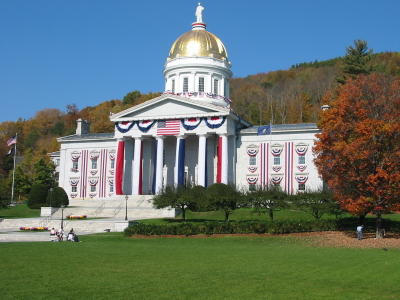 And finally, the obligatory shot of the statehouse building. Tourists ride for hours on tour buses to take this very same photo. Now, through the miracle of science, you can right-click save-as and avoid the whole ugly journey sitting next to a bunch of blue hairs from parts unknown. By the way, the building isn't usually dressed up in all of that bunting. The bunting is only there as part of the Bi-Centennial Celebration this weekend.
And finally, the obligatory shot of the statehouse building. Tourists ride for hours on tour buses to take this very same photo. Now, through the miracle of science, you can right-click save-as and avoid the whole ugly journey sitting next to a bunch of blue hairs from parts unknown. By the way, the building isn't usually dressed up in all of that bunting. The bunting is only there as part of the Bi-Centennial Celebration this weekend.